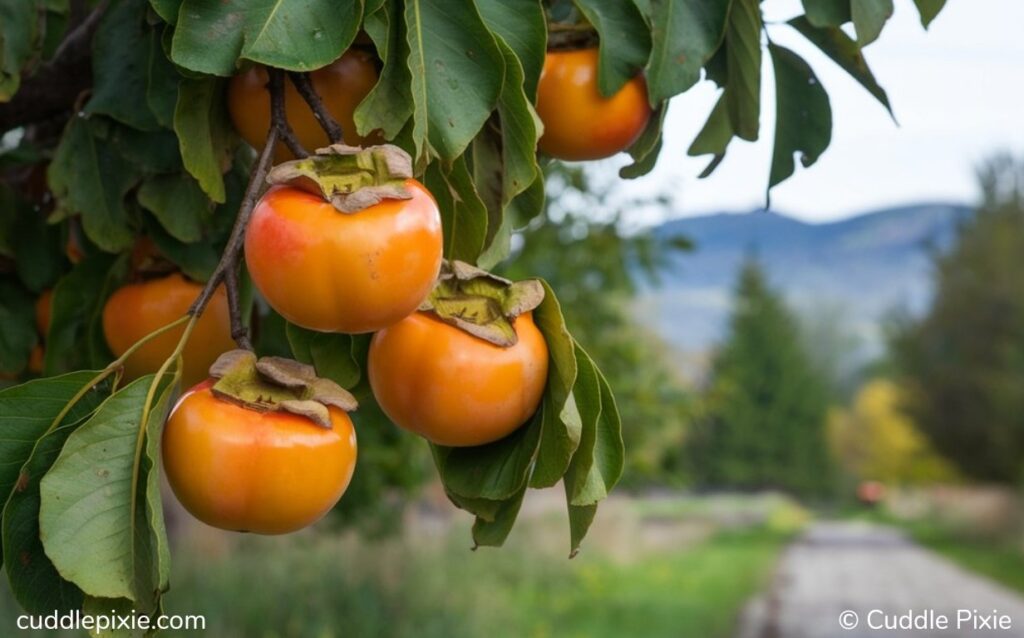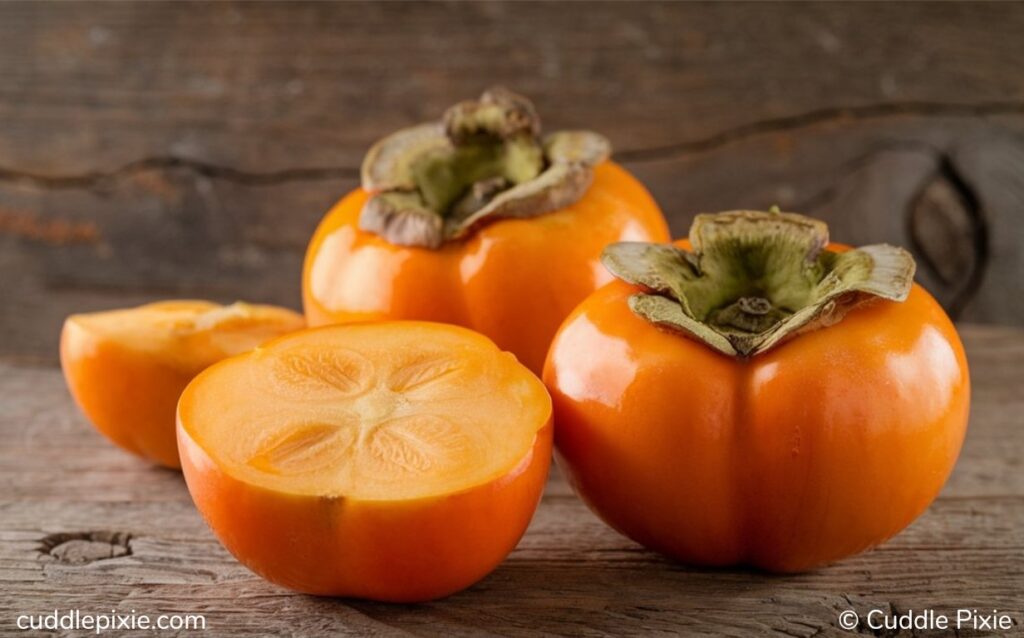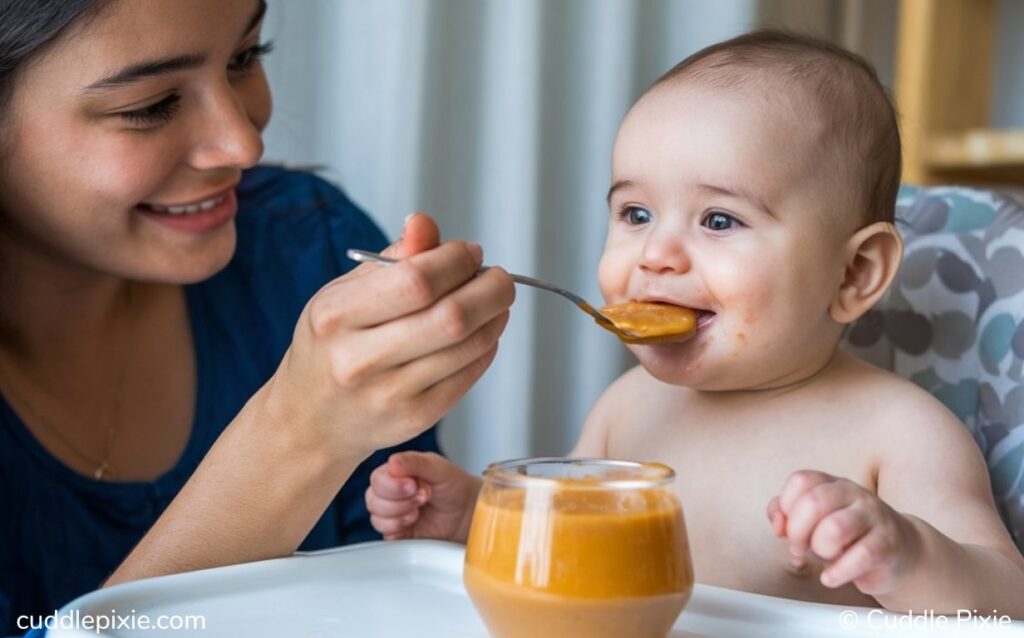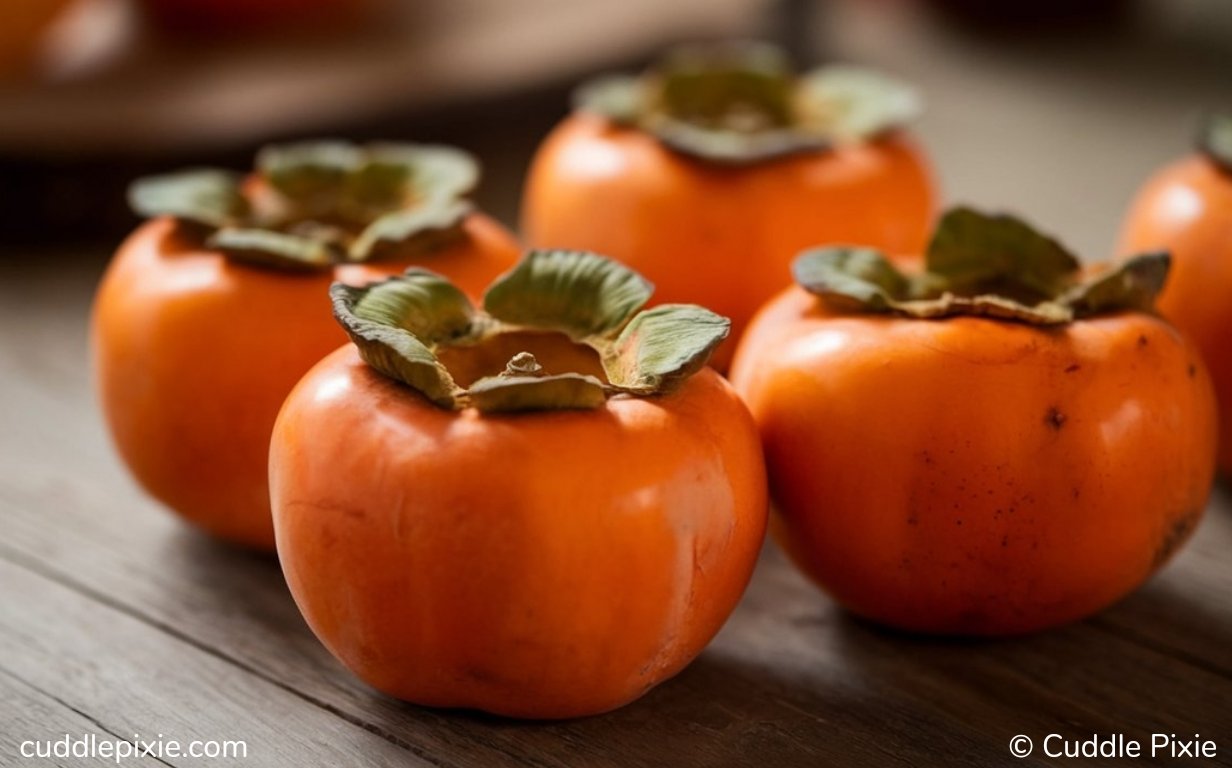Introducing new foods to your baby is both exciting and challenging. Parents often wonder which foods will benefit their baby’s growth and development the most. While staples like apples and bananas are popular first foods, fruits like persimmons can be equally beneficial but are often overlooked.
Persimmons are loaded with vitamins, minerals, and antioxidants that make them a nutritious addition to your baby’s diet. They can also play a crucial role in enhancing iron absorption something particularly important for babies prone to iron deficiency. In this article, we’ll explore everything you need to know about feeding persimmons to babies, from their nutritional benefits to preparation tips and safety concerns.
Table of Contents
The Nutritional Benefits of Persimmons for Babies
Persimmons, particularly the Japanese variety (Diospyros kaki), are a nutrient-dense fruit boasting essential vitamins and minerals vital for a baby’s development. These orange fruits come in different varieties, but the most commonly consumed types are Fuyu and Hachiya persimmons. Both varieties provide similar nutritional benefits but differ in texture and ripeness.

Key Vitamins and Nutrients in Persimmons
-
Vitamin A:
Persimmons are incredibly rich in Vitamin A, essential for eye health, immune function, and the development of healthy skin in babies. A 100-gram serving of persimmon provides about 81 micrograms of Vitamin A, which is 9% of the daily requirement for infants aged 7-12 months, according to the National Institutes of Health (NIH). -
Vitamin C:
Vitamin C is critical for boosting the immune system and promoting the absorption of iron from plant-based foods. Iron is crucial for babies, as it helps support cognitive development and prevents iron-deficiency anemia. A single medium-sized persimmon contains about 13 mg of Vitamin C, which can significantly aid iron absorption. According to a study published in Nutrients, consuming Vitamin C-rich foods like persimmons alongside iron-rich foods can increase the body’s ability to absorb non-heme iron (the type of iron found in plant-based sources). -
Fiber:
Persimmons are high in dietary fiber, essential for maintaining healthy digestion. Fiber helps regulate bowel movements and can prevent common digestive problems in infants, such as constipation. -
Antioxidants:
Persimmons are rich in antioxidants, including beta-carotene, lutein, and zeaxanthin, which are crucial for reducing oxidative stress and promoting healthy brain development in babies. -
Potassium:
Potassium is vital for maintaining proper fluid balance, supporting nerve function, and promoting heart health. Babies require potassium for healthy muscle function and cardiovascular health, and persimmons provide a good source of this essential mineral. -
Low Allergenic Risk:
Persimmons are not considered a common allergen, making them a relatively safe fruit to introduce to babies. They are also free from gluten and dairy, which makes them suitable for babies with intolerances or allergies.
Health Benefits of Persimmons for Babies

1. Supports Vision Development
Persimmons are an excellent source of Vitamin A, which is crucial for your baby’s vision. According to the American Journal of Clinical Nutrition, Vitamin A plays a vital role in developing and maintaining the retina, particularly the photoreceptor cells needed for good vision. A deficiency in Vitamin A can lead to poor vision and, in severe cases, even blindness.
2. Boosts Immune Function and Enhances Iron Absorption
Vitamin C in persimmons plays a dual role in supporting your baby’s health. Firstly, it helps strengthen the immune system by enhancing the production of white blood cells that fight off infections. Secondly, Vitamin C aids in iron absorption. Babies need iron to support red blood cell formation and prevent anemia, and consuming persimmons along with iron-rich foods like lentils, spinach, or fortified cereals can boost iron uptake. Research published in the Journal of Nutrition confirms that Vitamin C-rich fruits significantly enhance the absorption of non-heme iron, making persimmons an excellent companion to iron-rich baby foods.
3. Promotes Digestive Health
The fiber in persimmons helps regulate digestion, preventing constipation, which is a common issue for babies transitioning to solid foods. The American Journal of Gastroenterology highlights that fiber also promotes the growth of beneficial gut bacteria, contributing to better digestive health and overall well-being.
4. Rich in Antioxidants for Brain Development
Antioxidants, particularly beta-carotene, play a role in your baby’s cognitive development by protecting brain cells from oxidative stress. A study published in the Journal of Nutritional Biochemistry shows that foods high in antioxidants support brain health and reduce inflammation, which is critical during early childhood when the brain is developing rapidly.
When and How to Introduce Persimmons to Your Baby
Most pediatricians recommend introducing solid foods when your baby is around 6 months old. At this stage, babies are ready to explore new textures and flavors. Persimmons, with their sweet taste and smooth texture, make for an ideal early food.
It’s crucial to introduce one new food at a time and observe your baby for any allergic reactions. Although persimmons are not a common allergen, it’s always important to monitor for any unusual symptoms after feeding new foods.
How to Prepare Persimmons for Babies
Depending on your baby’s age and developmental stage, here are several ways to prepare persimmons:

For Babies (6-9 months old)
At this age, babies are just starting with solid foods, so purees are the best option. Here’s how to make a smooth persimmon puree:
- Wash and peel the persimmon to remove any pesticides or dirt.
- Remove the seeds (if using Hachiya persimmons) and cut the fruit into small pieces.
- Blend the persimmon until it reaches a smooth consistency. You can add a little breast milk, formula, or water to thin it out if needed.
- Serve the puree with a spoon.
Tip: Ripe persimmons (especially the Hachiya variety) are naturally very soft, so there’s no need to steam or cook them.
For Babies (9-12 months old)
As your baby grows and becomes more comfortable with textured foods, you can mash the persimmon with a fork and combine it with other baby-friendly foods such as:
- Mashed avocado for a creamy texture and added healthy fats.
- Oatmeal for a fiber-rich breakfast option.
For Toddlers (12+ months)
At this stage, your baby can start enjoying finger foods. Cut persimmons into small, bite-sized pieces, making sure they are soft and easy to chew. Always supervise your child while they are eating to prevent choking.
Persimmon Baby Food Recipes
Here are a few easy and nutritious recipes to make the most of persimmons for your baby:
1. Persimmon Puree
A simple, nutrient-packed puree perfect for first-time eaters.
Ingredients:
- 1 ripe persimmon (Fuyu or Hachiya)
- Water, breast milk, or formula (optional)
Instructions:
- Wash and peel the persimmon.
- Cut it into small pieces and blend it until smooth.
- Add water, breast milk, or formula to adjust the consistency as needed.
2. Persimmon and Avocado Mash
A creamy, delicious blend of persimmons and avocados, packed with healthy fats and vitamins.
Ingredients:
- 1 ripe persimmon
- 1/2 ripe avocado
Instructions:
- Peel and mash the persimmon and avocado.
- Mix until well combined, ensuring there are no large chunks.
- Serve immediately.
3. Iron-Rich Persimmon Oatmeal
Boost your baby’s iron levels by combining persimmons with iron-rich oats.
Ingredients:
- 1 ripe persimmon
- 1/2 cup rolled oats
- 1 cup water or milk
- 1 tbsp iron-fortified baby cereal (optional)
Instructions:
- Cook the oats according to package instructions.
- While the oats are cooking, peel and mash the persimmon.
- Once the oats are done, stir in the mashed persimmon.
- For an added iron boost, mix in a spoonful of iron-fortified baby cereal.
- Let the porridge cool before serving.
Safety Concerns: Can Babies Have Persimmons?
While persimmons are generally safe for babies, here are a few important safety considerations:

1. Allergies
Although persimmons are not a high-allergen food, always monitor your baby for signs of an allergic reaction when introducing any new food. Symptoms of an allergic reaction may include:
- Rash
- Vomiting
- Diarrhea
- Swelling around the mouth
If any of these symptoms occur, contact your pediatrician immediately.
2. Choking Hazards
Even though ripe persimmons are soft, the skin and seeds can still pose a choking hazard. Always remove the skin and seeds before serving persimmons to your baby, and cut them into small, bite-sized pieces when serving as finger food.
3. Unripe Persimmons and Tannins
Unripe persimmons, particularly Hachiya persimmons, contain high levels of tannins, which give them an astringent taste and can cause digestive discomfort. Always ensure that persimmons are fully ripe before feeding them to your baby. A ripe persimmon will be soft to the touch and have a jelly-like texture.
Frequently Asked Questions About Persimmons for Babies
Can I Freeze Persimmon Puree?
Yes! Persimmon puree can be frozen in an ice cube tray and stored for up to 3 months. When you’re ready to use it, simply thaw the puree in the refrigerator or microwave.
Can Babies Eat Unripe Persimmons?
No, unripe persimmons (especially the Hachiya variety) contain high levels of tannins, which can cause an unpleasant, astringent taste and may be difficult for babies to digest.
Can I Mix Persimmons with Other Fruits?
Absolutely! Persimmons pair well with fruits like apples, pears, and bananas. Mixing them with other fruits can create a more balanced flavor and texture for your baby.
Final Thoughts
Persimmons are a nutrient-packed fruit that can offer numerous health benefits to your baby, from supporting eye development to promoting a healthy digestive system and improving iron absorption. As long as you introduce persimmons at the right time and prepare them properly, they can be a sweet and healthy addition to your baby’s diet.
Whether you’re pureeing them for a 6-month-old or serving them as a finger food to a toddler, persimmons provide a delightful way to diversify your baby’s palate. So why not give this delicious fruit a try? With their sweet taste and abundant health benefits, persimmons could become a family favorite in no time.
References
- American Journal of Clinical Nutrition. (2004). The effect of vitamin C on non-heme iron absorption. American Journal of Clinical Nutrition, 79(4), 701-708.
- American Journal of Gastroenterology. (2011). Dietary fiber and digestive health. American Journal of Gastroenterology, 106(7), 1186-1192.
- Healthline. (2023). Persimmon nutrition and health benefits. Retrieved from https://www.healthline.com/nutrition/persimmon-nutrition-benefits
- Journal of Nutritional Biochemistry. (2009). Antioxidant and anti-inflammatory properties of beta-carotene. Journal of Nutritional Biochemistry, 20(5), 354-362.
- National Institutes of Health (NIH). (n.d.). Vitamin A. Retrieved from https://ods.od.nih.gov/factsheets/VitaminA-HealthProfessional/
- WebMD. (2023). Persimmons: Health benefits and nutrition. Retrieved from https://www.webmd.com/diet/health-benefits-persimmon
- Wholesome Baby Food. (n.d.). Persimmon baby food recipes. Retrieved from https://wholesomebabyfood.momtastic.com/persimmonbabyfoodrecipes.htm
- Solid Starts. (2023). Persimmons for babies: What you need to know. Retrieved from https://solidstarts.com/foods/persimmon/
- Raising Veggie Lovers. (n.d.). Persimmon baby food. Retrieved from https://raisingveggielovers.com/persimmon-baby-food/
